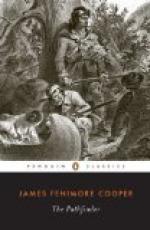“And you are known to be the greatest rifle shot that ever pulled trigger in all this region.”
“If Mabel could fancy a man for that, I might have no great reason to despair; and yet, Sergeant, I sometimes think that it is all as much owing to Killdeer as to any skill of my own. It is sartainly a wonderful piece, and might do as much in the hands of another.”
“That is your own humble opinion of yourself, Pathfinder; but we have seen too many fail with the same weapon, and you succeed too often with the rifles of other men, to allow me to agree with you. We will get up a shooting match in a day or two, when you can show your skill, and when Mabel will form some judgment concerning your true character.”
“Will that be fair, Sergeant? Everybody knows that Killdeer seldom misses; and ought we to make a trial of this sort when we all know what must be the result?”
“Tut, tut, man! I foresee I must do half this courting for you. For one who is always inside of the smoke in a skirmish, you are the faintest-hearted suitor I ever met with. Remember, Mabel comes of a bold stock; and the girl will be as likely to admire a man as her mother was before her.”
Here the Sergeant arose, and proceeded to attend to his never-ceasing duties, without apology; the terms on which the guide stood with all in the garrison rendering this freedom quite a matter of course.
The reader will have gathered from the conversation just related, one of the plans that Sergeant Dunham had in view in causing his daughter to be brought to the frontier. Although necessarily much weaned from the caresses and blandishments that had rendered his child so dear to him during the first year or two of his widowerhood, he had still a strong but somewhat latent love for her. Accustomed to command and to obey, without being questioned himself or questioning others, concerning the reasonableness of the mandates, he was perhaps too much disposed to believe that his daughter would marry the man he might select, while he was far from being disposed to do violence to her wishes. The fact was; few knew the Pathfinder intimately without secretly believing him to be one of extraordinary qualities. Ever the same, simple-minded, faithful, utterly without fear, and yet prudent, foremost in all warrantable enterprises, or what the opinion of the day considered as such, and never engaged in anything to call a blush to his cheek or censure on his acts, it was not possible to live much with this being and not feel respect and admiration for him which had no reference to his position in life. The most surprising peculiarity about the man himself was the entire indifference with which he regarded all distinctions which did not depend on personal merit. He was respectful to his superiors from habit; but had often been known to correct their mistakes and to reprove their vices with a fearlessness that proved how essentially he




